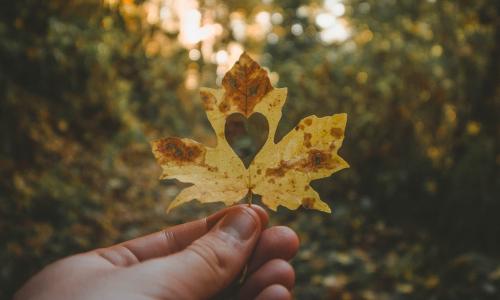
Love in the Time of Corona: Building Our Nature Better through Actions
By: Nanda Noor, Sustainable Land Use Project Lead
This article is different from the other similarly-titled romance-like stories during COVID-19, nor inspired from the best-selling novel ‘Love in the Time of Cholera’. I started writing this piece after publishing a personal leadership reflection, only to realize the significantly missing puzzle piece: love. Enabled by my office experience, this piece explores different perspectives on the meaning of love during the pandemic. Is it true that great love is not spoken, but acted upon? And what role can love play in building back better?
At WRI, where advancing sustainable development is our purpose, love isn’t often expressed orally or in writing, but everyone showed it in action. Our hearts are dedicated to serving Indonesia in its war against the climate crisis - despite knowing we may fail. Because it is still better to have loved the Earth and lost this war, than to never love it at all. Despite the recurring feeling of fear and tiredness, when humans love enough, perhaps few good things are achievable - or if it doesn’t, love would at least make the journey worthwhile. For me, this power can be proven through three types of love during this pandemic, reflecting from our two practical activities: emission-driven tree planting and health-driven forest restoration.
Firstly, love for nature. These activities are motivated by our belief that anyone possesses the power to save Indonesia’s climate when they care enough and want to act on it, even while being worried with this pandemic. When given the easiest possible way to do so, any individual can feel the pride of having contributed to greening the nation. This is why we provide measurable numbers of emission absorbed by the trees, so people can track and show their love even more. During the first three months of the pandemic, enough crowd contributed to plant more than 5,000 trees, absorbing at least 12.5 tons of CO2 per year over the trees’ lifetime. These were done while almost everyone’s attention during corona was on healthcare and the economy - perhaps not a bad example of showing love for the environment.

Like a tree, love needs to be planted and handled with care, for it to shine and show its meaning. Photo credit: Fadi XD/Unsplash
The second love is for the people. While planting trees help save the environment, it is us that are saved first. More trees will help reduce more pollution - one of the prerequisites of better quality of life. Research begins to state that reduced forests may increase chances for animals to get sick and infect humans as they lose their natural habitats - arguably the reason COVID-19 happened in the first place. Planting trees may help relieve this, and also provide an additional income for villagers for taking care of the trees, covering the economic loss due to the pandemic. From now on, instead of just saying the common and simple “please stay safe” phrase in human conversations, we can also express how much we love our health, physically and mentally, by planting trees. Imagine how much we wanted to see the bright smile of the people we love in the real world, and rather than worrying about it, we can act to help make sure it happens.
Lastly, loving love itself. This one is called ‘loving’ for a reason - because love is a verb, not a noun or adjective. Love is like muscles - to stay strong, it requires consistent exercising and arduous labour, more doing than just being. If we don’t love the process of loving, we can’t stay in love to experience and appreciate the entire journey. This is why at WRI, we believe that nurturing trees every single day is crucial so it can grow big and serve its purpose to absorb emissions. Your actions and contribution would also be translated into periodic tree monitoring and replanting. In other words, consistent care - a basic ingredient of love - would be delivered from anyone to nature.
These examples show that during this unprecedented situation, compassion can grow into a potentially serious scale. In forest restoration cases, building back better with enough love isn’t easy, but it is as Muhammad Assad wrote in his book. - no growth in comfort, and no comfort in growth. To move forward stronger, loving sustainability better begins from each of our hearts and beliefs. That’s why for WRIers, LOVE even stands for ‘Living Our Values Everyday’. And that values include love with selfless ending, because sharing means caring.

Like life, love demands its owner to keep it on and shared at every second, for its power to stay. Photo credit: Wyron A/Unsplash
I personally hope we don’t need something similar to the pandemic situation like this to realize how powerful love can be, and how far we should embrace it. For me, I know that corona made me fall in love more with Earth, its nature and what I am doing with it, because I find it hard to fall asleep - a sign that the reality is now better than my dreams. Perhaps I finally understood that in the end, life without love is like a planted tree that doesn’t blossom or bear fruit. When all seems difficult and even lost due to the pandemic, love that is acted upon, should at least be the one powerful, most realistic thing that survives. Because love that comes out of a serious and long test in the time of corona, means it would perhaps be here for good.
If you are someone like me, who rediscovered what love and loving means in the time of corona, let’s connect. Stay in love, spread the love, healthily!